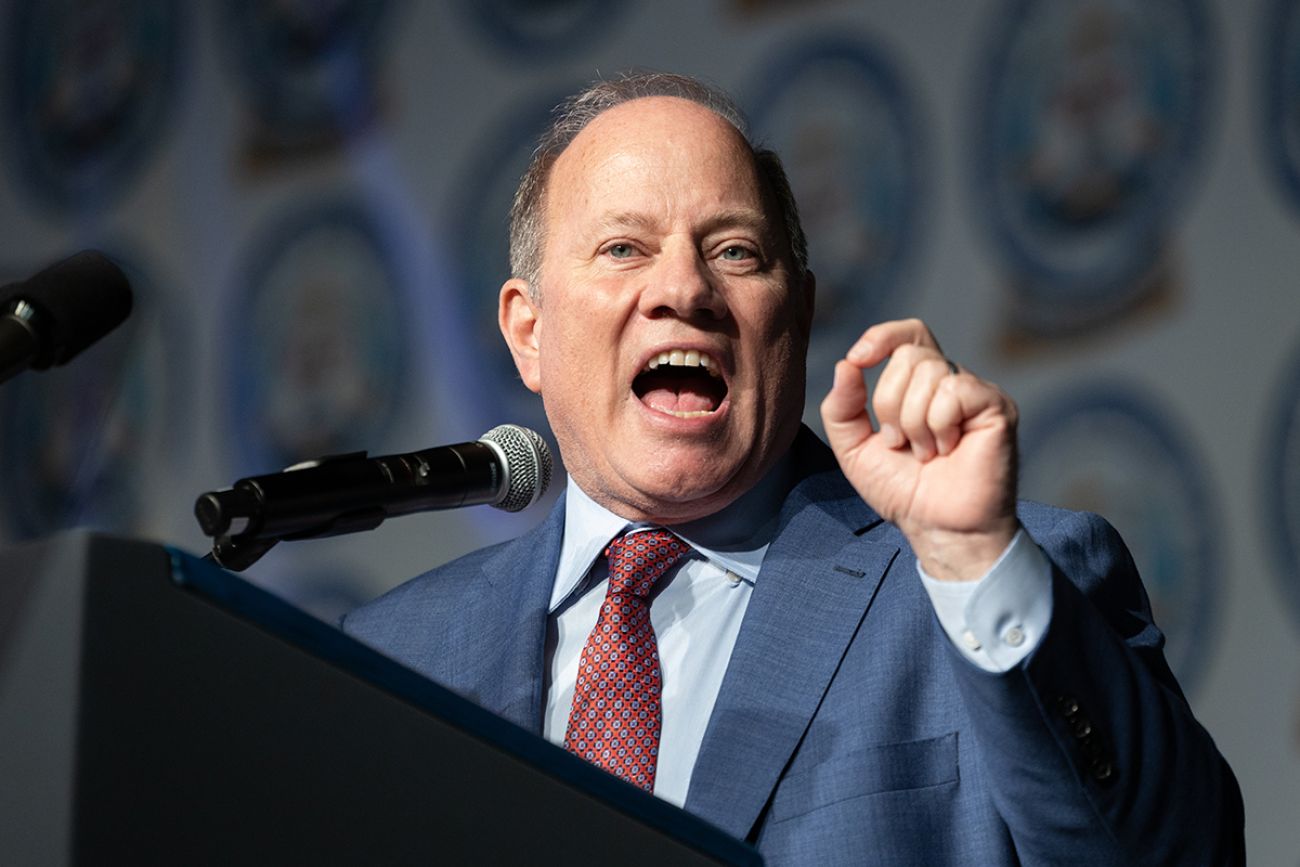Detroit Mayor Mike Duggan upends Michigan governor race with independent campaign

- Detroit Mayor Mike Duggan announced he is running for governor as an independent
- The three-time mayor said he wants to give Michigan voters ‘a new choice’
- Duggan’s candidacy potentially ‘changes the math’ for other possible contenders in the 2026 race
Detroit’s Democratic Mayor Mike Duggan is running for governor of Michigan — as an independent, an unexpected political pivot that one former state official called a "potentially seismic event” for the 2026 race.
Duggan announced his bid Wednesday in a YouTube video, asking: “What if we upended the system and gave Michigan voters a new choice? A governor who didn’t run as a candidate of either party but went to work every day with no goal except to get people to work together for all of Michigan.”
The announcement comes weeks after Duggan announced that he would not seek re-election for a fourth term in Detroit, sparking speculation that he would run for governor.
Duggan was elected mayor of Michigan’s largest city in 2013, when he ran a write-in campaign after failing to qualify for the primary ballot by narrowly missing a one-year residency rule.The position is technically nonpartisan, but Duggan has been a vocal Democrat and spoke at national party conventions.
Duggan declared earlier this year that he was "100% behind" Kamala Harris in the presidential election but said Wednesday that working class voters no longer seem to believe the party represents them.
“There have been a lot of people who feel left out of both parties, feel like they don’t have a place where they belong, and being limited in two parties,” Duggan said. “I’ve watched what’s happened in Lansing, and it has gotten worse and worse. The partisan environment is more and more toxic.”
“I realized that, as a Democratic governor, anything I proposed would be met with immediate resistance,” Duggan said.
Independent campaign ‘changes the math’
Duggan is the first high-profile candidate to announce a campaign to succeed Michigan Gov. Gretchen Whitmer, a Democrat who cannot seek re-election due to the state’s term limits law.
Other potential candidates include Democrats like Secretary of State Jocelyn Benson or Lt. Gov. Garlin Gilchrist and Republicans like Senate Minority Leader Aric Nesbitt or 2022 gubernatorial nominee Tudor Dixon.
Related:
- Why Mike Duggan is running for Michigan governor as an independent
- Michigan House Speaker Joe Tate eyes run for Detroit mayor
- Has Michigan governor race begun? Here's who might run
Duggan’s decision to run as an independent could be a “seismic event,” former Lt. Gov. Brian Calley, a Republican, wrote in a social media post.
Citing Duggan’s nonpartisan bona fides and ability to fundraise, Calley noted “it substantially changes the math for every other candidate thinking about a run.”
An independent candidacy allows Duggan to sidestep the partisan primary process completely, a significant advantage in what could shape up to be a crowded Democratic field.
Instead, Duggan will simply have to collect 12,000 signatures within 180 days by July 16th, 2026, to place his name on the general election ballot, said Jeff Schroder, an election law attorney with Plunkett Cooney.
State law requires upwards of 30,000, but a 2019 federal lawsuit successfully lowered the ceiling. At the time, Judge Victoria Roberts noted that "no independent candidate for statewide office" had ever collected enough signatures to make the ballot.
A credible independent campaign could leave Democrats — a party in which Duggan has many fans — with some agonizing decisions to make.
If Duggan attracts significant funding and support while Democrats also field a candidate, it could siphon support from their nominee and essentially guarantee a Republican victory. At the same time, in a three-way race, Duggan has to bet he can attract enough moderate and conservative support to neutralize any aid he’d give to the GOP nominee.
“Michigan has a lot of straight-ticket voting, and there's no straight-ticket independent voting, because it's not a party,” Schroder said. “It's a huge barrier to success for independents.”
An uncertain path
Duggan will have plenty of time to change his mind if he decides to seek the Democratic nomination, however. Major-party candidates have until the spring of 2026 to collect at least 15,000 signatures to make the primary ballot.
Republican consultant Dave Forsmark said he sees “no path to victory” for Duggan without major party backing and that an independent campaign would “make it impossible for the Democrats to win the governorship."
US Sen. Elissa Slotkin showed Democrats can still win statewide, Forsmark said, telling Bridge he isn’t convinced Duggan will maintain no party affiliation for his entire campaign.
“He could go all over the state trying to rally everybody and get people over to his side, and then … he could announce ‘I'm gonna seek the Democratic nomination’ after he's convinced everybody he’s not a big partisan,” Forsmark added.
Michigan has a partisan primary system where Democratic and Republican gubernatorial nominees — after submitting petition signatures to appear on the ballot — are chosen in a statewide vote. Those will have to be submitted in May, leaving Duggan with nearly 18 months before his affiliation is set in stone.
Still, Dave Dulio, a political science professor and longtime observer of Michigan politics, believes Duggan’s course is decided.
“I think you'll have a Republican nominee, a Democratic nominee, and Mike Duggan,” Dulio said.
“Having Duggan and Benson in the primary is different than Duggan and Benson in the general,” Dulio said. “I think it favors Duggan quite honestly.”
Benson, in a social media message posted less than an hour after Duggan's announcement, said she was "proud to be a Democrat."
"We are the party that recognizes we're all in this together and we will only truly thrive and prosper when all thrive and prosper."
‘What can I do to help?’
Duggan talked with Detroit reporters Wednesday in a studio outside the Packard Plant site, a former symbol of the city’s blight which was demolished under his administration.
There, Duggan said he expects Michigan voters will see his track record in Detroit and trust him to lead the state. He recently met with local officials in Traverse City to learn about the area’s affordable housing shortcomings, he said.
“We’ve got to change the performance of our schools, and I don’t think that’s a Republican or a Democratic issue,” Duggan said. “That’s the kind of thing I’m going to talk about more than business or labor. How are things in your community? What can I do to help?”
“I thought if there was ever a time to give people a third choice, this would be the year,” Duggan said.
As for his ability to raise funds without the backing of a major political party?
“I think the funding will follow momentum, and I will go into every corner of this state where communities invite me,” Duggan said.
“We’ll see relatively quickly whether I can relate to people in different parts of the state.”
See what new members are saying about why they donated to Bridge Michigan:
- “In order for this information to be accurate and unbiased it must be underwritten by its readers, not by special interests.” - Larry S.
- “Not many other media sources report on the topics Bridge does.” - Susan B.
- “Your journalism is outstanding and rare these days.” - Mark S.
If you want to ensure the future of nonpartisan, nonprofit Michigan journalism, please become a member today. You, too, will be asked why you donated and maybe we'll feature your quote next time!




